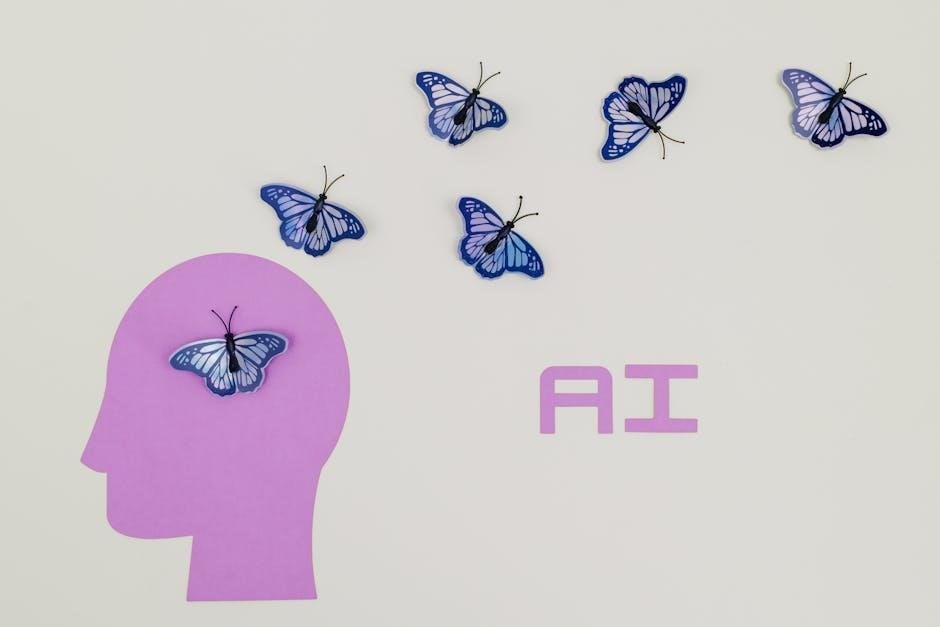The National Association for Interpretation (NAI) is a professional organization dedicated to advancing the field of interpretation, providing training, certification, and resources for interpreters globally.
1.1 Overview of NAI’s Mission and Goals
The National Association for Interpretation (NAI) aims to advance the field of interpretation by fostering communication, cultural awareness, and professional standards. Its mission is to empower interpreters through education, certification, and networking opportunities. NAI focuses on promoting excellence in interpretive practices, ensuring that professionals are equipped to bridge communication gaps and enhance understanding across diverse settings, including healthcare, education, and community services.
1.2 History and Evolution of NAI
Founded with a vision to enhance interpretive practices, the National Association for Interpretation (NAI) has evolved into a leading professional organization. Established to address the growing need for standardized interpretation, NAI has expanded its reach, incorporating new technologies and methodologies. Over the years, it has remained committed to fostering excellence, adapting to industry changes, and supporting interpreters through training, certification, and networking opportunities, solidifying its role as a leader in the field.

The Certified Interpretive Guide (CIG) Program
The Certified Interpretive Guide (CIG) Program offers specialized training and certification for interpreters, enhancing their skills in communication, cultural awareness, and professional expertise through a structured curriculum.
2.1 Requirements and Eligibility for Certification
To qualify for the Certified Interpretive Guide (CIG) program, candidates must complete NAI’s training course, demonstrate interpretive skills, and pass a comprehensive exam. Eligibility includes a background in interpretation or a related field, with a focus on professional ethics and commitment to cultural sensitivity. The program ensures candidates meet high standards of expertise and accountability in interpretation.
2.2 The Certification Process and Exam Details
The certification process involves completing NAI’s training course, followed by a written exam and a practical demonstration of interpretive skills. The exam evaluates knowledge of interpretation principles, communication techniques, and cultural sensitivity. Candidates must score at least 80% to pass. The process ensures a standardized assessment of competencies, maintaining the integrity of the Certified Interpretive Guide (CIG) credential.

Benefits of Becoming a Certified Interpretive Guide
Becoming a Certified Interpretive Guide enhances credibility, improves interpretive skills, and opens doors to professional opportunities. It also fosters networking and access to exclusive resources for interpreters.
3.1 Professional Development and Career Advancement
Certification through NAI enhances professional credibility and opens pathways for career growth. It equips guides with advanced interpretive skills, improving job prospects and leadership opportunities in diverse fields. Additionally, NAI’s resources and networking support long-term professional development, enabling guides to stay updated on industry trends and best practices, thereby advancing their careers effectively.
3.2 Enhanced Interpretive Skills and Knowledge

NAI’s certification programs foster deeper understanding and mastery of interpretive techniques, enabling guides to communicate complex ideas effectively. By focusing on storytelling, audience engagement, and cultural sensitivity, certified guides gain the expertise to convey information accurately and meaningfully. This enhancement ensures they can adapt to various settings, delivering impactful and educational experiences that resonate with diverse audiences.

The Role of Interpretive Guides in Various Fields
Interpretive guides play a crucial role in diverse sectors, including healthcare, education, and cultural preservation, serving as bridges between information and audiences to ensure understanding and engagement.
4.1 Interpretation in Healthcare and Medical Settings
Interpretive guides in healthcare play a vital role in ensuring clear communication between patients and medical professionals. They facilitate accurate diagnoses by interpreting complex medical information and cultural nuances. Certified guides adhere to ethical standards, maintaining confidentiality and providing empathetic support. Their expertise bridges language gaps, enabling effective treatment plans and fostering trust in diverse healthcare environments. This role is essential for improving patient outcomes and ensuring equitable access to quality care.
4.2 Interpretation in Education and Community Services
In education and community services, interpretive guides connect diverse populations with essential information and resources. They facilitate language access in schools, workshops, and community programs, ensuring inclusivity and understanding. Certified guides enhance cultural awareness, break down communication barriers, and empower individuals to engage fully with educational and social services, fostering stronger, more informed communities through their dedicated work and professional expertise.

Continuing Education and Professional Growth
NAI offers workshops, webinars, and courses to enhance interpretive skills, ensuring professionals stay updated on industry trends and best practices for continuous career development and excellence.
5.1 NAI’s Training and Certification Programs
NAI offers comprehensive training and certification programs, including a 32-hour course, to enhance interpretive skills and knowledge. These programs cover topics like interpretive planning, audience engagement, and cultural sensitivity, ensuring professionals meet high standards. The Certified Interpretive Guide (CIG) and Certified Interpretive Planner (CIP) programs are designed to advance careers and foster expertise in interpretation, providing practical tools for real-world applications and professional growth.
5.2 Networking Opportunities with NAI
NAI provides extensive networking opportunities, enabling professionals to connect with interpreters across cultural, historical, and natural fields. Through workshops, regional events, and online forums, members can exchange resources and ideas, fostering collaboration and innovation. These connections help interpreters stay updated on industry trends and best practices, while also building a supportive community dedicated to advancing interpretation globally.

The Importance of Certification in Interpretation
Certification in interpretation establishes credibility and ensures interpreters meet professional standards, fostering trust and accountability in critical fields like healthcare and education.
6.1 Professional Standards and Accountability
The Certified Interpretive Guide (CIG) program upholds professional standards, ensuring interpreters possess the necessary skills and knowledge to deliver accurate and ethical interpretations. NAI’s certification establishes accountability, fostering trust and effectiveness in communication across diverse settings, from parks and museums to healthcare and education.
6.2 Legal and Ethical Considerations
Legal and ethical considerations are crucial for Certified Interpretive Guides, ensuring confidentiality, accuracy, and impartiality. The CIG program emphasizes adherence to professional conduct, respecting cultural diversity, and maintaining ethical standards in interpretation. Legal requirements vary by setting, but certification ensures interpreters are prepared to navigate these challenges while upholding integrity and fairness in communication.

The Impact of Certified Interpretive Guides on Communities
Certified Interpretive Guides foster understanding and connection within diverse communities by bridging communication gaps and promoting cultural awareness, enhancing inclusivity and empathy in public and educational settings.
7.1 Bridging Communication Gaps in Diverse Settings
Certified Interpretive Guides effectively bridge communication gaps in diverse settings by facilitating clear, accurate exchanges between individuals of different linguistic and cultural backgrounds. This fosters mutual understanding, reduces misunderstandings, and ensures equitable access to information. By leveraging their expertise, they create inclusive environments where diverse groups can engage meaningfully, enhancing collaboration and community cohesion across various professional contexts.
7.2 Promoting Cultural Awareness and Understanding
Certified Interpretive Guides play a crucial role in promoting cultural awareness by interpreting diverse traditions, values, and histories. They use engaging techniques to educate audiences, fostering appreciation and respect for cultural differences. By sharing stories and perspectives, they help bridge cultural divides, enriching communities and encouraging cross-cultural understanding and empathy in various settings, from educational institutions to public spaces.

The Future of Interpretation and NAI’s Role
NAI will continue to lead in advancing interpretation by fostering innovation, promoting professional standards, and supporting interpreters in meeting evolving demands across diverse fields and communities.
8.1 Emerging Trends in Interpretation
Emerging trends in interpretation include the integration of technology, such as remote interpreting and AI-driven tools, to enhance accuracy and accessibility. There is also a growing emphasis on specialized interpretation in fields like healthcare and education, requiring interpreters to possess tailored skills. Additionally, sustainability practices and global connectivity are reshaping how interpreters engage with diverse audiences, ensuring culturally sensitive and effective communication across borders and industries.
8.2 NAI’s Vision for the Future of Interpretation
NAI envisions a future where interpretation is universally accessible, fostering deeper connections across cultures and environments. By integrating advanced technologies and expanding certification programs, NAI aims to empower interpreters with innovative tools and expertise; The organization is committed to promoting excellence, cultural awareness, and professional growth, ensuring interpreters meet the evolving demands of a globalized world while maintaining high standards of ethics and effectiveness.

Success Stories and Case Studies
NAI’s Certified Interpretive Guide program has empowered professionals, fostering impactful communication in diverse settings, with success stories showcasing enhanced skills and community engagement.
9.1 Real-World Applications of Interpretive Skills
Certified Interpretive Guides apply their skills in diverse settings, such as parks, museums, and healthcare, bridging communication gaps and fostering cultural understanding. They engage audiences through storytelling, tours, and educational programs, ensuring meaningful interactions with natural, historical, and cultural resources. These professionals enhance community connections, making complex information accessible and inspiring stewardship and appreciation for diverse environments and traditions.
9.2 Testimonials from Certified Interpretive Guides
Certified Interpretive Guides often share their transformative experiences, highlighting how NAI certification enhanced their careers and personal growth. Many note improved storytelling techniques and deeper audience connections. They emphasize the program’s rigorous standards and practical application, which have elevated their professionalism and confidence in interpreting diverse cultural and natural resources. These testimonials underscore the lasting impact of NAI certification on both professional and community levels.
NAI certification empowers professionals to deliver exceptional interpretive experiences, fostering meaningful connections and enriching communities through accurate, engaging, and culturally sensitive communication, as highlighted by testimonials and real-world applications.
10.1 Final Thoughts on the Value of NAI Certification
NAI certification is a cornerstone for professionals seeking excellence in interpretation, offering enhanced skills, career growth, and the ability to bridge communication gaps in diverse settings. It ensures interpreters meet high standards, fostering cultural awareness and understanding. By becoming certified, individuals not only advance their careers but also contribute to stronger, more inclusive communities. NAI’s support and resources empower guides to navigate evolving trends, ensuring impactful and meaningful interpretive experiences.